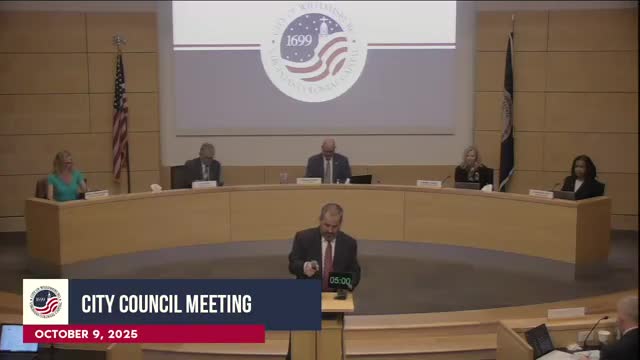Williamsburg requires special-use permits for retailers selling vape, tobacco and hemp products
Get AI-powered insights, summaries, and transcripts
Subscribe
Summary
On Oct. 9, Williamsburg City Council approved PCR 25-008, a zoning text amendment requiring businesses that sell tobacco, hemp or vape products to obtain a special-use permit and barring those uses within 1,000 linear feet of child day centers and schools; existing lawfully permitted sellers are grandfathered.
Williamsburg City Council on Oct. 9 approved PCR 25-008, a city-initiated zoning text amendment that requires establishments selling tobacco, hemp or vape products to obtain a special-use permit and prohibits those uses within 1,000 linear feet of a child day-care center or any public, private or parochial school.
City planning staff presented the proposal at a public hearing and told council the amendment aims to “protect the community character of Williamsburg by ensuring that establishments that sell tobacco vape products do go through the public hearing process and are not located adjacent to incompatible uses, namely day care centers and schools.” The change clarifies that any establishment choosing to sell those products must seek a special-use permit rather than relying on an unclear “primary purpose” standard that staff said could allow a business to operate effectively as a vape shop while bypassing public review.
The amendment adopts the state code’s product definition and adds the 1,000-foot location restriction. Planning staff and the planning commission noted that businesses lawfully selling these products under existing approvals are grandfathered and would not be retroactively required to secure special-use permits. The planning commission recommended approval by a 5–2–1 vote during its September meeting, staff said.
Council members asked how the rule would be enforced and how to tell whether a change in inventory shifts a business’s use. Vice Mayor Dent asked for enforcement details and was told the city operates primarily on a complaint-driven basis: the zoning administrator would investigate complaints or evaluate new proposals at application, issue a notice of violation if needed, and require either a special-use permit application or cessation of sales. The presenter said the special-use permit process typically takes three to six months and provides opportunities for public hearings and conditions imposed by council.
Councilmembers also raised scenarios involving grandfathered convenience stores that increase the share of vape or tobacco products over time. Planning staff said such cases would be evaluated on a fact-specific basis and that a substantial change in how much of a store’s business consists of these products could be treated as a change of use requiring a special-use permit.
After discussion, council voted to adopt PCR 25-008. Miss McKay recorded the vote as unanimous in favor of the amendment.
The ordinance amendment is intended to close a regulatory gap staff said had allowed prospective operators to claim incidental retail status and avoid public review, and to give the city authority to impose conditions where sales of these products are approved.
